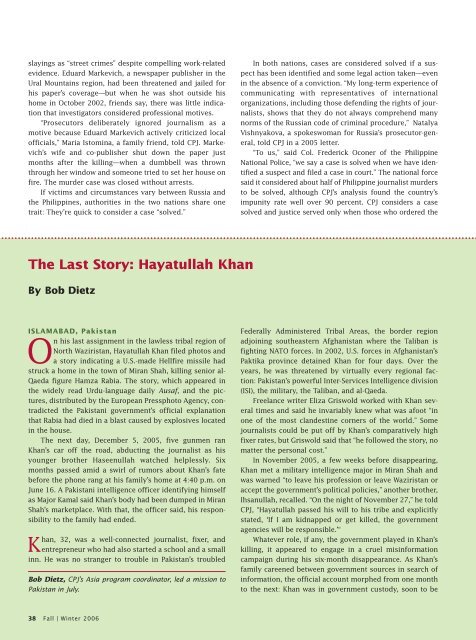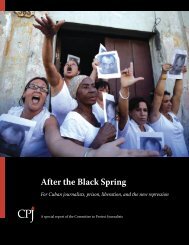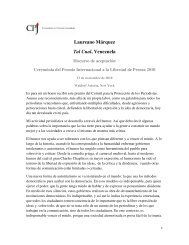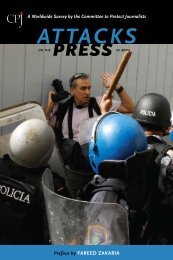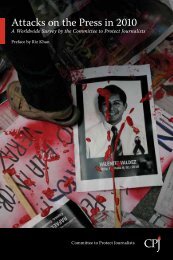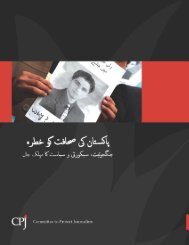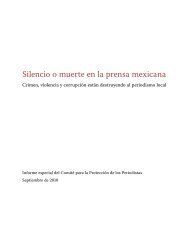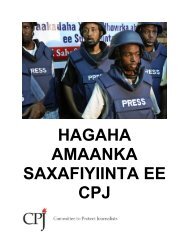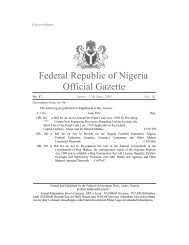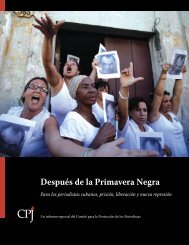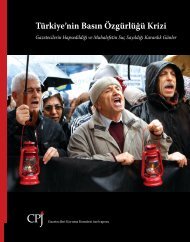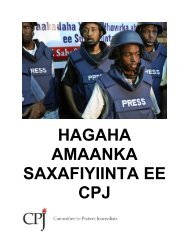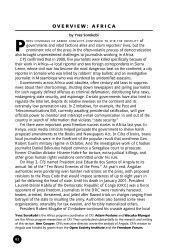Read the magazine online (PDF) - Committee to Protect Journalists
Read the magazine online (PDF) - Committee to Protect Journalists
Read the magazine online (PDF) - Committee to Protect Journalists
Create successful ePaper yourself
Turn your PDF publications into a flip-book with our unique Google optimized e-Paper software.
Mission Journal | A Look Back<br />
AP/Oscar Navarrete<br />
caution, however. “We still don’t really know what’s going <strong>to</strong><br />
happen,” he said and asked that we not use his name. The<br />
publisher at ano<strong>the</strong>r paper, Prensa Libre, was more blunt.<br />
“This is war,” he said, noting that his edi<strong>to</strong>r had recently<br />
been kidnapped by guerrillas and was still missing.<br />
The haggling within our delegation followed us home as<br />
we sought <strong>to</strong> hammer out a statement that all could live<br />
with. Don’t ask me how, but Weinstein ended up drafting <strong>the</strong><br />
Nicaragua and El Salvador sections. (He left <strong>the</strong> delegation<br />
before it got <strong>to</strong> Guatemala.) The statement on Nicaragua<br />
contained political commentary that seemed <strong>to</strong> me extraneous<br />
<strong>to</strong> <strong>the</strong> press situation <strong>the</strong>re, and I said so at <strong>the</strong> press<br />
conference we held. Some 75 journalists attended <strong>the</strong> event,<br />
and our statement was written up in The New York Times<br />
and o<strong>the</strong>r publications.<br />
Did it have any effect I don’t think so. Conditions for<br />
<strong>the</strong> press worsened in all three countries. The investigation<br />
in<strong>to</strong> <strong>the</strong> deaths of <strong>the</strong> Dutch journalists stalled. (Soon after<br />
we issued our statement, I got a call from I.F. S<strong>to</strong>ne angrily<br />
upbraiding us for not digging deeper in<strong>to</strong> <strong>the</strong> case.) La<br />
Prensa continued <strong>to</strong> publish throughout <strong>the</strong> Contra war but<br />
was largely defanged. In Guatemala, Rios Montt proved<br />
even more brutal than his predecessor, and <strong>the</strong> edi<strong>to</strong>r of<br />
Diario El Gráfico with whom we’d talked, and who had<br />
asked that his name not be used, was murdered several<br />
years later. Throughout, <strong>the</strong> Reagan administration confined<br />
its concerns over press freedom <strong>to</strong> Nicaragua.<br />
For CPJ, however, <strong>the</strong> mission was invaluable, for it<br />
imparted some important lessons. One was <strong>to</strong> keep delegations<br />
small. The larger <strong>the</strong> group, <strong>the</strong> more unwieldy it<br />
becomes. We also learned <strong>to</strong> avoid selecting participants<br />
according <strong>to</strong> some ideological standard. The key is <strong>to</strong> pick<br />
accomplished journalists with an uncompromising commitment<br />
<strong>to</strong> <strong>the</strong> cause of press freedom. Finally, in designing<br />
missions, we found that it helps <strong>to</strong> keep <strong>the</strong> scope limited.<br />
Visiting three war-fractured countries in 10 days was<br />
wildly unrealistic.<br />
Fortified by <strong>the</strong>se lessons, CPJ <strong>to</strong>day conducts more<br />
than a dozen missions a year, pulling <strong>the</strong>m off with great<br />
aplomb. For me, however, <strong>the</strong> memories of that first mission<br />
linger, and while I’ve been on several trips since, I’ve<br />
gone mostly solo. As for Allen Weinstein, <strong>to</strong>day he’s <strong>the</strong><br />
direc<strong>to</strong>r of <strong>the</strong> National Archives. ■<br />
Sandinista soldiers cross a stream during a confrontation with Contras in Las Pinuelas, Nicaragua. Throughout <strong>the</strong> 1980s, <strong>the</strong> United<br />
States expressed concern over press freedom in strife-ridden Nicaragua but not in o<strong>the</strong>r Central American countries.<br />
A Matter<br />
of Commitment<br />
Missions <strong>to</strong> Ethiopia and Eritrea tested CPJ and showed <strong>the</strong> importance of<br />
Washing<strong>to</strong>n’s leadership.<br />
By Josh Friedman<br />
Ethiopia and Eritrea are on <strong>the</strong> frontier of <strong>the</strong> struggle<br />
for press freedom. Isolated in high mountains, <strong>the</strong><br />
two countries test <strong>the</strong> limits of CPJ’s ability <strong>to</strong> aid<br />
endangered journalists. In four missions since 1996 (three<br />
<strong>to</strong> Ethiopia and one <strong>to</strong> Eritrea), we have had mixed success—owing<br />
more <strong>to</strong> <strong>the</strong> changing attitudes of officials in<br />
Washing<strong>to</strong>n than <strong>to</strong> leaders in <strong>the</strong> strategically crucial Horn<br />
of Africa.<br />
What are we dealing with <strong>Journalists</strong> in <strong>the</strong>se two<br />
countries face obstacles those of us in free countries can<br />
only imagine. In Ethiopia, joking about <strong>the</strong> prime minister<br />
sent a car<strong>to</strong>onist <strong>to</strong> jail for years. In Eritrea, an edi<strong>to</strong>rial urging<br />
good government led <strong>to</strong> <strong>the</strong> mass roundup and continued<br />
disappearance of virtually every independent journalist<br />
in <strong>the</strong> country.<br />
Ethiopia has a long his<strong>to</strong>ry of jailing journalists, and<br />
since 2001 Eritrea has had more than a dozen journalists<br />
imprisoned in secret locations without charge. As of 2005,<br />
Ethiopia and Eritrea lagged only China and Cuba as <strong>the</strong><br />
world’s <strong>to</strong>p jailers of journalists.<br />
So when CPJ asked me <strong>to</strong> participate in missions <strong>to</strong><br />
<strong>the</strong>se two remote countries I jumped at <strong>the</strong> chance. I had<br />
gotten <strong>to</strong> know <strong>the</strong>m as a newspaper reporter in <strong>the</strong> mid-<br />
1980s when <strong>the</strong>y were one country under a murderous<br />
Soviet-backed dicta<strong>to</strong>rship called <strong>the</strong> Derg, headed by<br />
Mengistu Haile Mariam. A free press did not exist. Now, in<br />
1996, on <strong>the</strong> first of two CPJ missions I accompanied, I<br />
would have a chance <strong>to</strong> see how <strong>the</strong> press had developed<br />
after <strong>the</strong> Derg fell in 1991.<br />
Josh Friedman is direc<strong>to</strong>r of international programs at <strong>the</strong><br />
Columbia University Graduate School of Journalism. A former<br />
reporter for Newsday, he won <strong>the</strong> 1985 Pulitzer Prize<br />
for international reporting for his coverage of <strong>the</strong> famine in<br />
Ethiopia.<br />
In a word, it was heartrending. In both countries, eager,<br />
optimistic, and mostly inexperienced young people—and<br />
die-hards from <strong>the</strong> previous regime—had become instant<br />
journalists. In Ethiopia, nearly 100 publications, mostly oneor<br />
two-person affairs, poured forth a mixture of real news,<br />
rumor, accidentally fake news, deliberately fake news, and<br />
ad hominem attacks on <strong>the</strong> country’s new leaders.<br />
The hard-bitten guerrilla leaders who had taken over<br />
Ethiopia—and <strong>the</strong>n Eritrea when it seceded—recoiled in<br />
horror at <strong>the</strong> exuberant free press. After all, <strong>the</strong>se were doctrinaire<br />
Marxists who had spent decades fighting from cave<br />
hideouts where <strong>the</strong>y had enforced discipline through selfcriticism<br />
sessions and strict adherence <strong>to</strong> ideology. Determined<br />
<strong>to</strong> maximize pressure on <strong>the</strong> press despite having<br />
signed human rights accords <strong>to</strong> please Western donors, <strong>the</strong><br />
new leaders of Ethiopia and Eritrea found more subtle ways<br />
<strong>to</strong> intimidate <strong>the</strong> media.<br />
In Ethiopia, for example, edi<strong>to</strong>rs routinely have multiple<br />
criminal charges pending under a repressive 1992 press<br />
law, ensuring that <strong>the</strong>y can easily be sent <strong>to</strong> jail. Authorities<br />
also use under-<strong>the</strong>-radar techniques such as putting pressure<br />
on printers.<br />
So what could a CPJ mission do <strong>to</strong> confront this On <strong>the</strong><br />
ground we could ga<strong>the</strong>r facts <strong>to</strong> inform <strong>the</strong> world what was<br />
happening, buck up endangered journalists, comfort <strong>the</strong><br />
families of <strong>the</strong> jailed or missing, rally <strong>the</strong> small network of<br />
diplomats committed <strong>to</strong> a free press—and plead with and<br />
cajole <strong>the</strong> countries’ new leaders <strong>to</strong> be patient with an<br />
embryonic press.<br />
This last was <strong>the</strong> hardest. For millennia, because of<br />
<strong>the</strong>ir isolation on high mountain plateaus, Ethiopia and<br />
Eritrea had developed a culture of distrusting outsiders,<br />
whom <strong>the</strong>y called ferengi. Foreign invaders had come and<br />
gone—often meting out cruelty. One of my best sources in<br />
Ethiopia, scion of a long-deposed aris<strong>to</strong>cratic family, was<br />
76 Fall | Winter 2006<br />
Dangerous Assignments<br />
77


